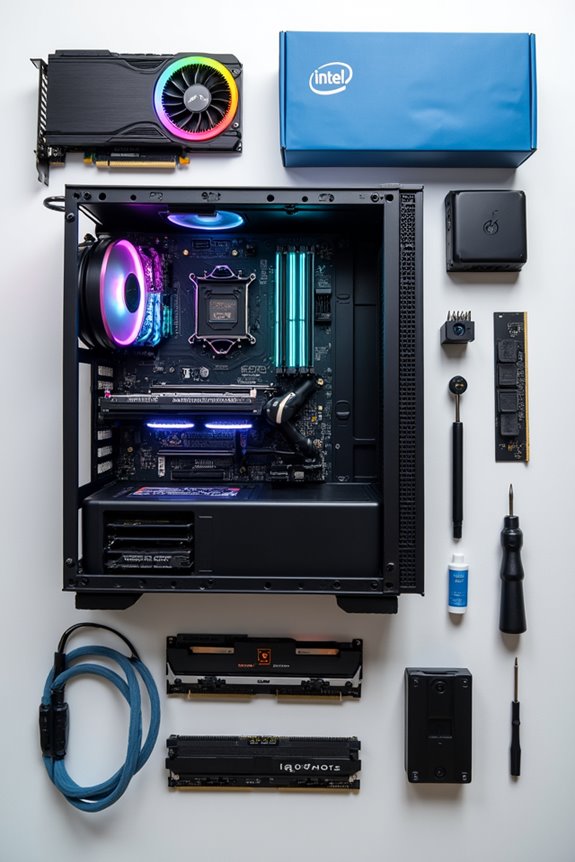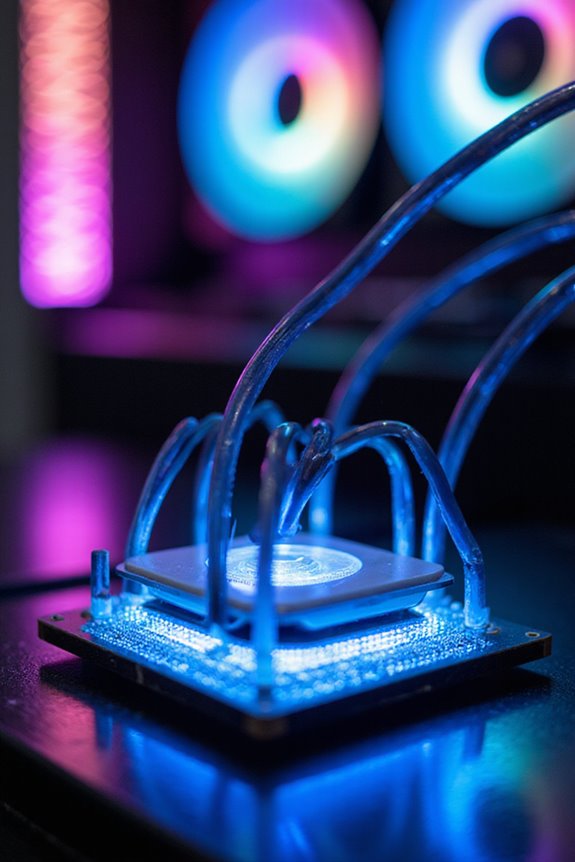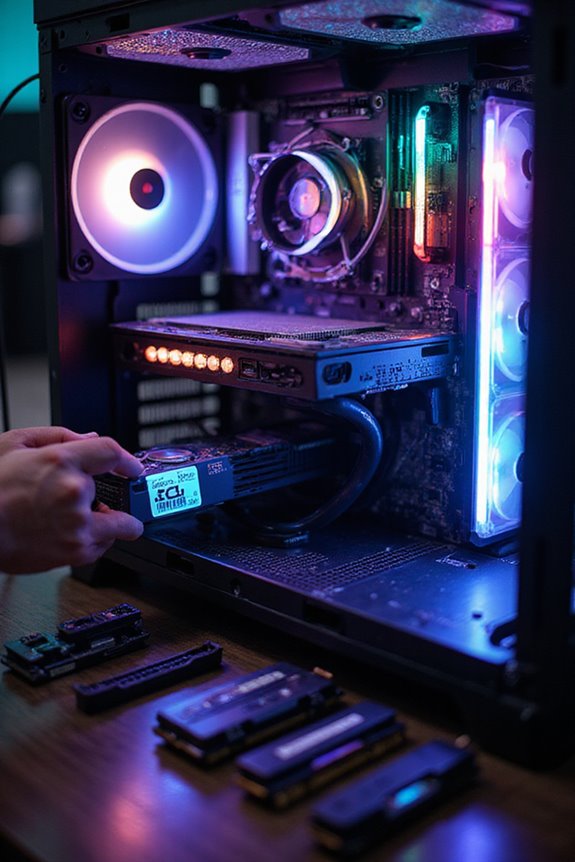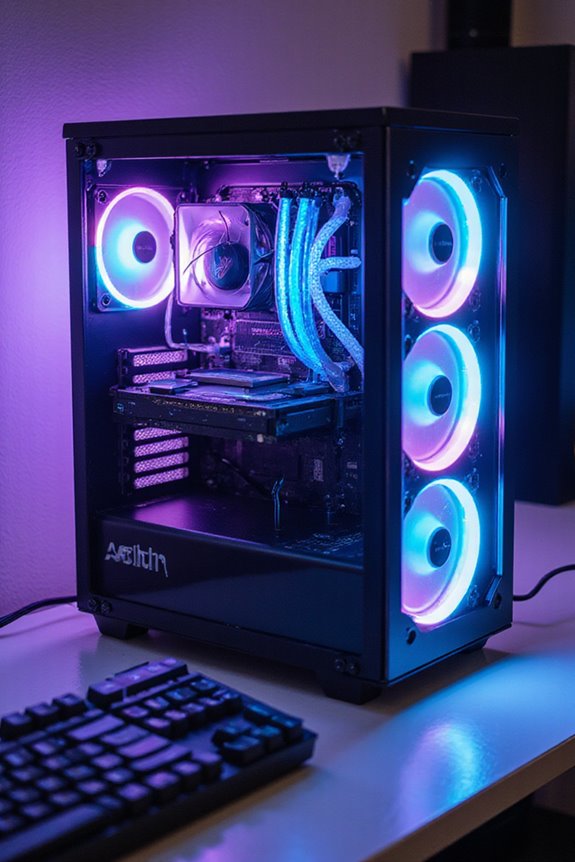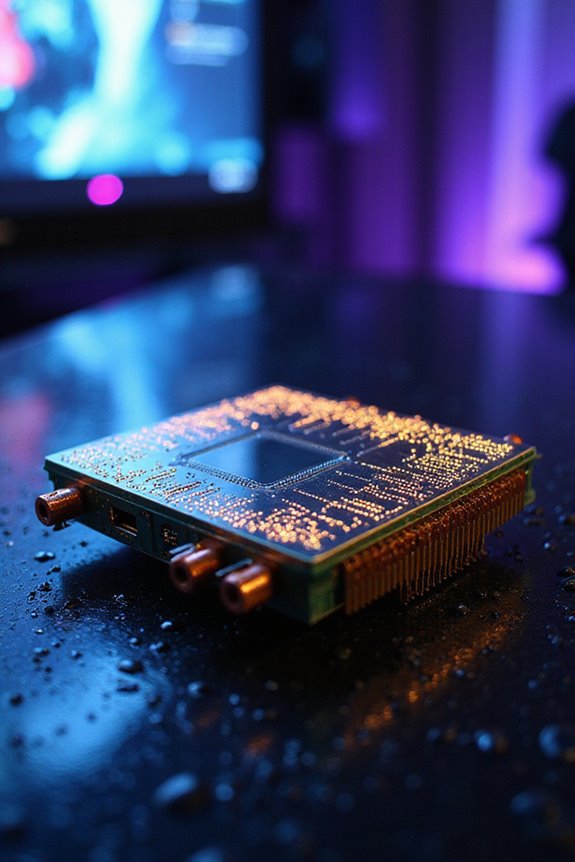To build a 4K gaming PC, I recommend starting with at least a GPU like the NVIDIA RTX 5070 Ti or the top-tier RTX 5090. Pair it with a powerful CPU, such as the AMD Ryzen 9 9950X3D for excellent multitasking. Don’t forget 16GB, preferably 32GB of DDR4 or DDR5 RAM, and an M.2 NVMe SSD for quick load times. Confirm your power supply is at least 750W. There’s a bit more to take into account, so let’s explore further.
Key Takeaways
- Choose a high-end GPU like NVIDIA RTX 5090 or RTX 5070 Ti for optimal 4K gaming performance.
- Pair the GPU with a powerful CPU, such as AMD Ryzen 9 9950X3D, for multitasking and gaming.
- Ensure at least 16GB of RAM, preferably 32GB, and utilize fast M.2 NVMe SSD storage for quick load times.
- Select a power supply of 750W+ with 80 Plus Gold certification for efficiency and reliability.
- Optimize graphics settings and keep drivers updated to enhance performance and overall gaming experience.
Understanding 4K Gaming Requirements
When diving into the world of 4K gaming, it is vital to grasp what your setup needs to deliver that stunning visual experience. First, you’ll want a resolution of 3840×2160 pixels, which demands powerful hardware for smooth 4K performance. A refresh rate of at least 60Hz is key; without it, those graphics can feel choppy.
I also recommend a response time of 5ms or less to avoid motion blur during intense action sequences. Make sure you have HDMI 2.0 or DisplayPort 1.4 for proper connectivity. Keep in mind that achieving consistent 4K performance can strain your budget, as high-end components aren’t cheap. Balancing quality and cost is essential for an enjoyable gaming experience.
Selecting the Right GPU
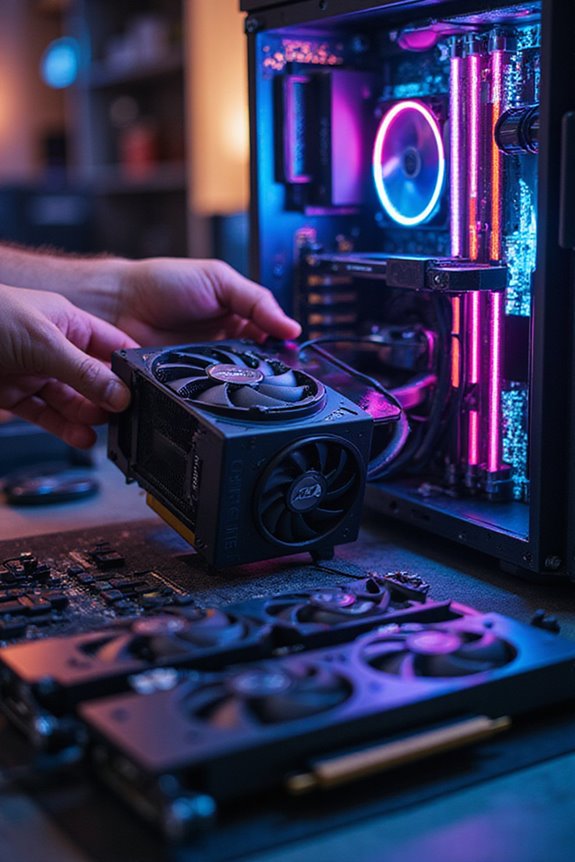
Selecting the right GPU is essential for your gaming experience, especially if you’re aiming for that eye-popping 4K resolution. When it comes to GPU compatibility, top-tier options like the NVIDIA RTX 5090 with 32GB GDDR7 VRAM can handle max settings, while the RTX 5070 Ti offers solid 4K performance at a lower price. I find performance metrics vital; you should aim for at least 60 FPS for smooth gameplay. Don’t forget about power consumption and cooling, as high-end GPUs require robust setups. Remember, the AMD Radeon RX 9070 is a competitive choice, though it can’t quite match NVIDIA’s dominance in this space. Ultimately, your budget should guide your decision, balancing price against performance.
Choosing an Optimal CPU
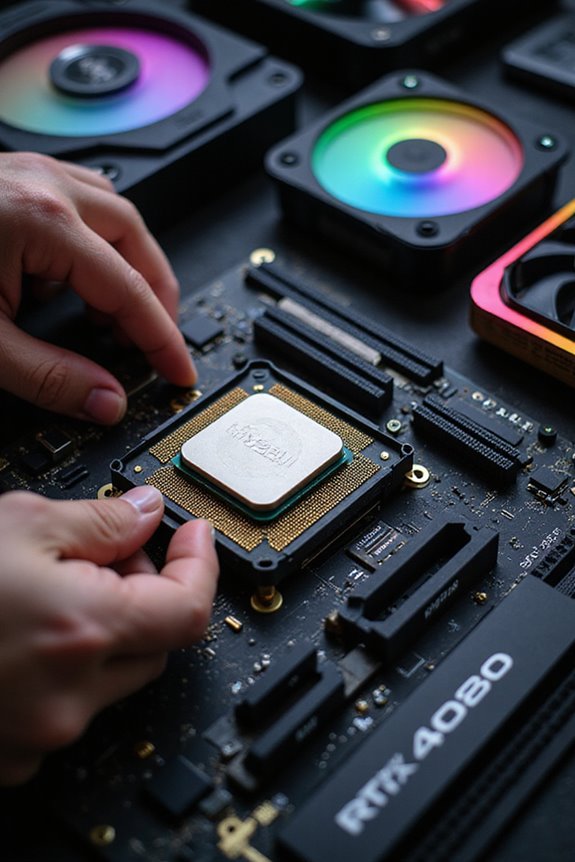
After picking out a GPU that suits your gaming needs, the next step is choosing an ideal CPU to match it. For top-tier performance, consider the AMD Ryzen 9 9950X3D, which excels in demanding 4K gaming and multitasking. Its CPU compatibility with the latest motherboards guarantees you’ll get high memory speeds essential for your build. If you’re budget-conscious, the Intel Core i5 12400F still delivers great performance with decent thermal management and lower power consumption. Performance benchmarks reveal that while overclocking potential varies, it can lead to impressive gains. Just keep in mind that extreme CPU-bound scenarios may limit your experience. Choose wisely, and your gaming setup will be ready for the future!
Determining RAM and Storage Needs
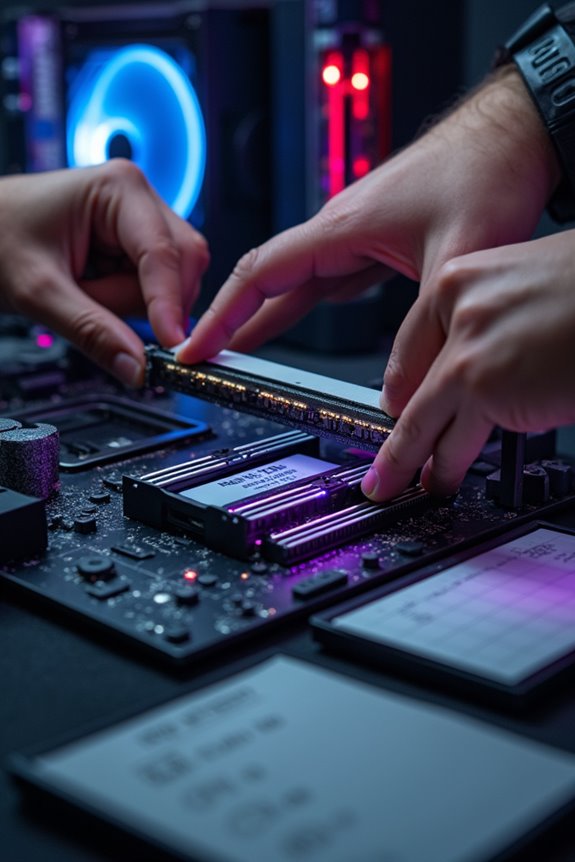
Building a gaming PC isn’t just about choosing the right GPU and CPU; RAM and storage play important roles too. For 4K gaming, I recommend at least 16GB of RAM, but 32GB is preferable for future-proofing and multitasking efficiency. DDR4 at 3600MHz or DDR5 above 4800MHz are great RAM types that can handle upcoming game requirements.
When it comes to storage solutions, an M.2 NVMe SSD is necessary for fast loading speeds, ensuring seamless gameplay. A minimum of 1TB is required, but 2TB or more is best for extensive libraries. Balancing RAM and storage impacts performance greatly; more RAM enhances multitasking, while fast storage reduces load times, making system integration essential for a superior gaming experience.
Power Supply Selection
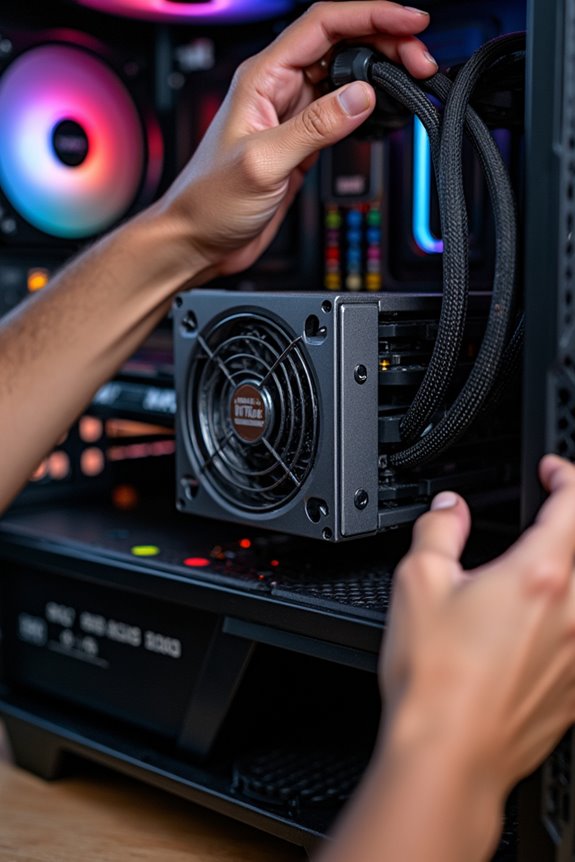
Choosing the right power supply unit (PSU) is a key step in building your gaming PC, especially as you consider the demands of 4K gaming. For a robust setup, I recommend a PSU with at least 750W for mid-range builds and 1000W or more for high-end configurations. Look for power supply types with high efficiency ratings, like 80 Plus Gold or Platinum, as they deliver superior power while minimizing heat. It’s vital to guarantee compatibility with all your components, so checking connector types is a must. Don’t forget to add some overhead—100-200 watts—to accommodate future upgrades. A reliable PSU not only powers your rig but also keeps it running smoothly, which is something you definitely want for those intense gaming sessions.
Cooling Solutions for High Performance
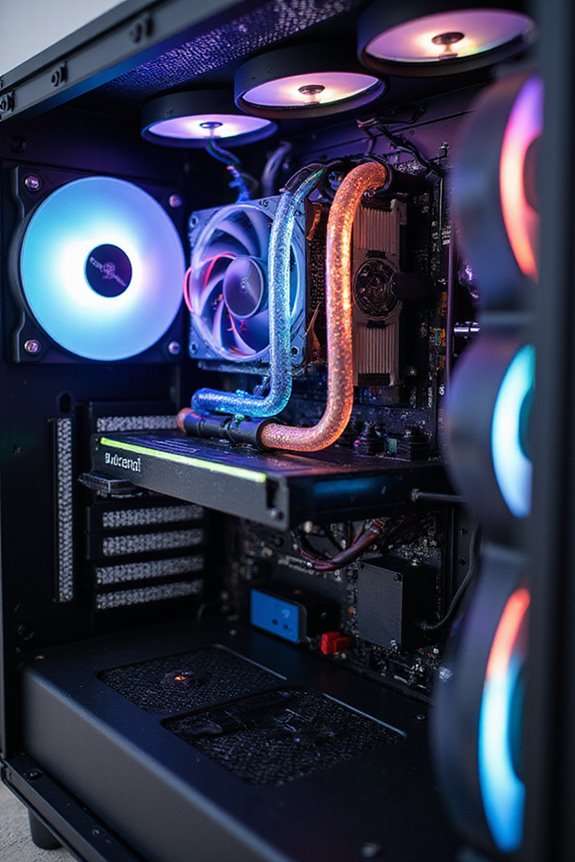
When it comes to cooling solutions for high-performance gaming PCs, selecting the right system can make a world of difference in maintaining ideal temperatures during intense gaming sessions. Air coolers are budget-friendly, but for better cooling efficiency, I recommend AIO coolers like the Arctic Liquid Freezer III. They strike a nice balance between performance and ease of installation, making them a solid choice.
If you’re after the ultimate cooling power, consider custom liquid cooling, though it requires more setup and maintenance. Remember, pump reliability is essential here—trustworthy brands like EKWB or Corsair Hydro X Series guarantee longevity. Don’t overlook radiator size and fan quality; larger setups generally cool better and run quieter, keeping your gaming experience smooth and enjoyable.
Building the PC: Step-by-Step Guide
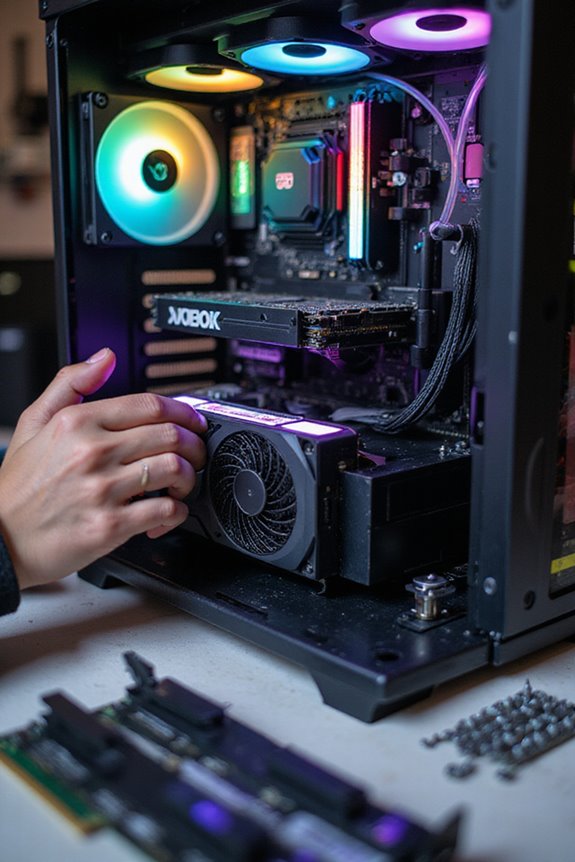
Getting started on your PC build can feel like a challenging task, but breaking it down into manageable steps makes it much easier. First, assemble the case by securely installing your motherboard, CPU, and GPU. Next, connect the power supply unit to all components. Remember, good cable management is key here; it improves airflow and keeps things tidy. After that, install your cooling system, including the CPU cooler and case fans. Once everything’s in place, double-check connections to verify compatibility and stability. Finally, perform a power-on test for performance verification. With everything running smoothly, you’ll be ready to plunge into the exciting world of 4K gaming—just make sure to admire your handiwork along the way!
Testing and Benchmarking Your Build
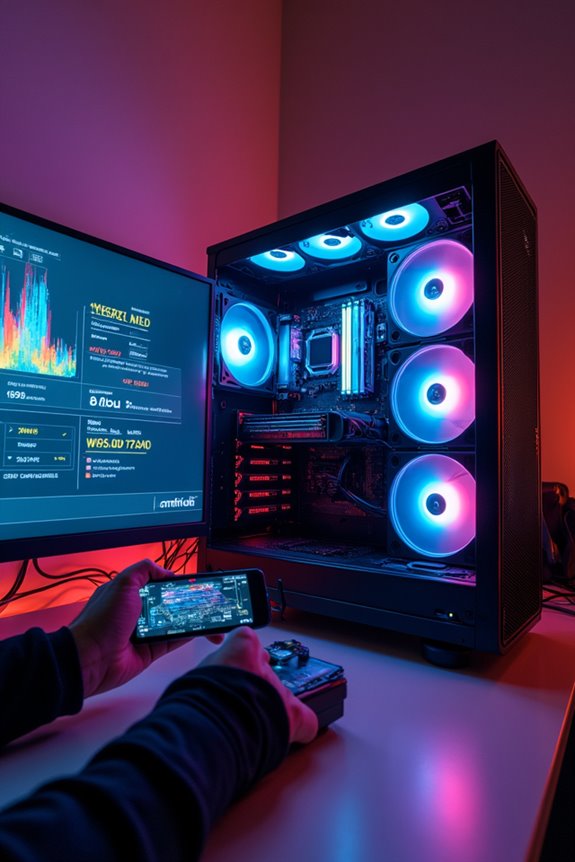
As you plunge into testing and benchmarking your newly built gaming PC, it’s essential to confirm everything is running at its peak performance. I recommend using benchmarking tools like 3DMark and PassMark PerformanceTest. These tools provide detailed performance metrics, allowing you to assess your GPU, CPU, and memory.
3DMark’s Steel Nomad, for instance, mimics modern game graphics at 4K, helping you see how your setup handles real-world scenarios. Automated test suites streamline the process, delivering easy comparisons. Just remember, while these benchmarks offer valuable insights, they may not capture every nuance of gaming performance. Still, they’re a solid start to verify your rig is ready for the latest titles. Happy testing!
Future-Proofing Your Gaming PC
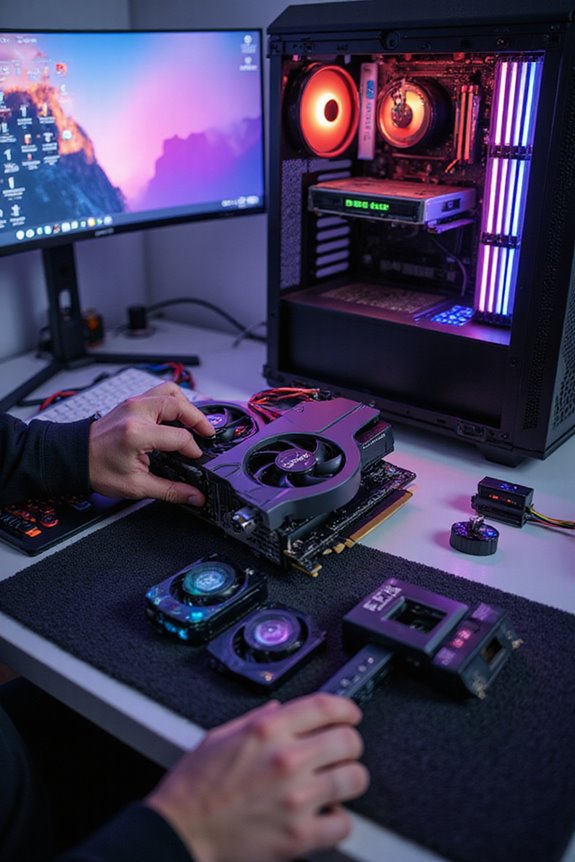
To guarantee your gaming PC stands the test of time, it’s vital to choose components that not only meet today’s demands but can also adapt to future advancements. I recommend opting for a CPU with at least 8 cores, like the AMD Ryzen 7 or Intel i7. These processors offer long-term compatibility with future motherboard chipsets and sockets, allowing for future upgrades without hassle.
For the GPU, verify it supports PCIe 5.0, which is essential for next-gen technologies. Also, go for fast DDR5 memory and NVMe SSDs for peak performance. Choosing a motherboard with ample expansion slots will enable you to add components later. Balancing these elements will give you a solid foundation for years of gaming enjoyment.
Enhancing Performance With Software Optimization
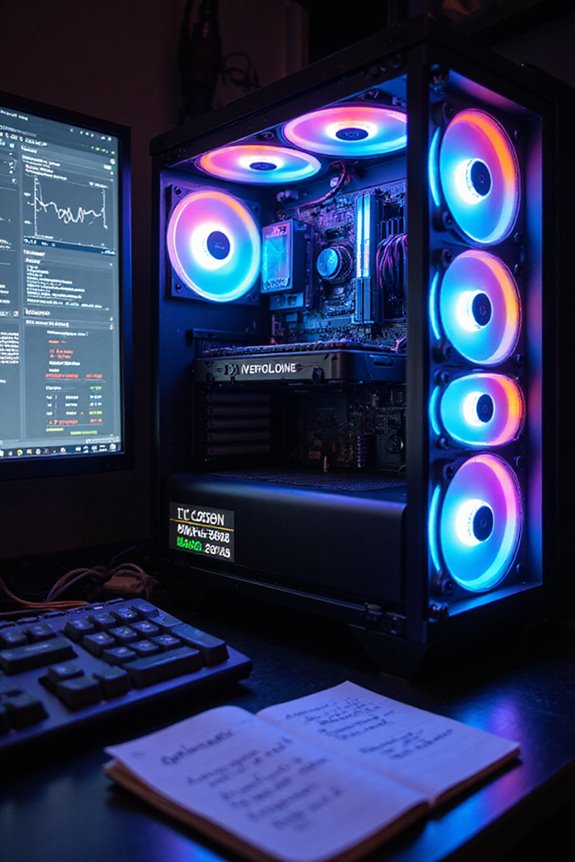
While building a gaming PC is an exciting endeavor, optimizing its performance with software tweaks can truly elevate your gaming experience. Start by ensuring software updates are current, particularly your GPU drivers, as manufacturers like Nvidia and AMD release essential updates. Next, immerse yourself in system tweaks; enabling Game Mode in Windows prioritizes gaming performance by minimizing background processes.
Resource management is key, so close unnecessary programs to free up valuable system resources. I also recommend adjusting power settings for consistent frame rates, and don’t forget about performance monitoring tools to keep an eye on your system’s health. Finally, tweak in-game settings—lowering resolution or adjusting graphics quality can notably enhance frame rates without sacrificing too much visual fidelity.
Frequently Asked Questions
What Monitor Features Should I Consider for 4K Gaming?
When choosing a monitor for 4K gaming, I first think about refresh rate and response time. Imagine crisp visuals dancing smoothly across the screen, ensuring every heartbeat and shot feels immersive and exhilarating.
How Do I Choose a Gaming Mouse and Keyboard?
When choosing a gaming mouse and keyboard, I focus on gaming ergonomics and mouse sensitivity. A comfortable design and precise tracking really enhance my gaming experience, making those long sessions much more enjoyable.
What Audio Setup Is Best for Immersive Gaming?
For immersive gaming, I recommend investing in high fidelity headphones for clarity and a surround sound system for depth. It really transforms the experience, letting me hear every detail and feel completely engaged in the game.
Should I Invest in a Gaming Chair?
I think investing in a gaming chair’s worth it for the ergonomic benefits. I’ve seen price comparisons showing that quality chairs can enhance comfort and performance, ultimately improving my overall gaming experience.
How Can I Optimize My Internet Connection for Gaming?
Ever wondered how to enhance your gaming experience? I’ve focused on reducing network latency and meeting bandwidth requirements by optimizing my router settings, using wired connections, and choosing a reliable ISP for seamless gameplay.

